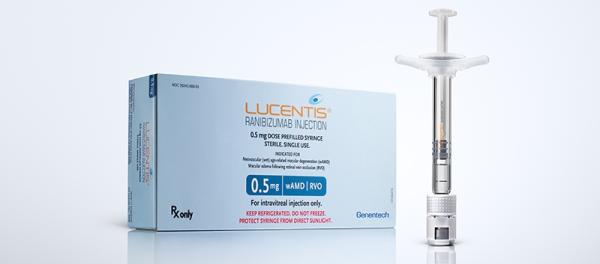Ranibizumab ophthalmic Disease Interactions
There are 2 disease interactions with ranibizumab ophthalmic.
Intravitreal injections (applies to ranibizumab ophthalmic) ocular infections
Major Potential Hazard, High plausibility. Applicable conditions: Uveitis, Orbital Infection, Infectious Endophthalmitis, Infectious Optic Neuritis
Drugs requiring intravitreal administration (including aflibercept, faricimab, pegaptanib, and ranibizumab) are contraindicated in patients with active intraocular inflammation or ocular/periocular infections; intravitreal injections have been associated with endophthalmitis. Patients should be advised to seek immediate medical attention from an ophthalmologist if the eye becomes red, photosensitive, or painful, or if a change in vision occurs in the days following drug administration.
Ranibizumab intravitreal injection (applies to ranibizumab ophthalmic) increased intraocular pressure
Moderate Potential Hazard, Moderate plausibility. Applicable conditions: Glaucoma/Intraocular Hypertension
Increases in intraocular pressure have been reported both pre- injection and post- injection (at 60 minutes) while being treated with ranibizumab. Intraocular pressure should be monitored prior and following intravitreal injection with ranibizumab and managed appropriately.
Switch to professional interaction data
Ranibizumab ophthalmic drug interactions
There are 2 drug interactions with ranibizumab ophthalmic.
More about ranibizumab ophthalmic
- ranibizumab ophthalmic consumer information
- Check interactions
- Compare alternatives
- Reviews (19)
- Side effects
- Dosage information
- During pregnancy
- Drug class: anti-angiogenic ophthalmic agents
- Breastfeeding
Related treatment guides
Drug Interaction Classification
| Highly clinically significant. Avoid combinations; the risk of the interaction outweighs the benefit. | |
| Moderately clinically significant. Usually avoid combinations; use it only under special circumstances. | |
| Minimally clinically significant. Minimize risk; assess risk and consider an alternative drug, take steps to circumvent the interaction risk and/or institute a monitoring plan. | |
| No interaction information available. |
See also:
Further information
Always consult your healthcare provider to ensure the information displayed on this page applies to your personal circumstances.


